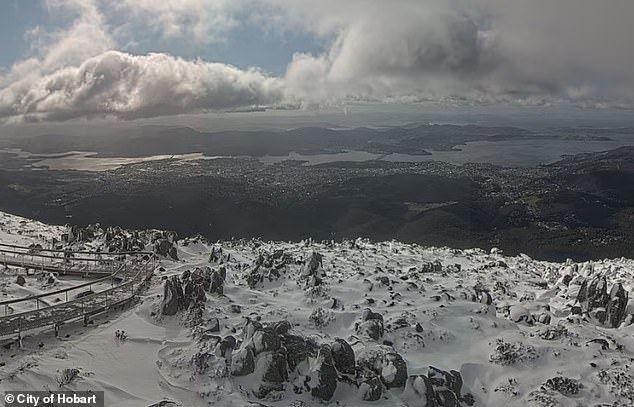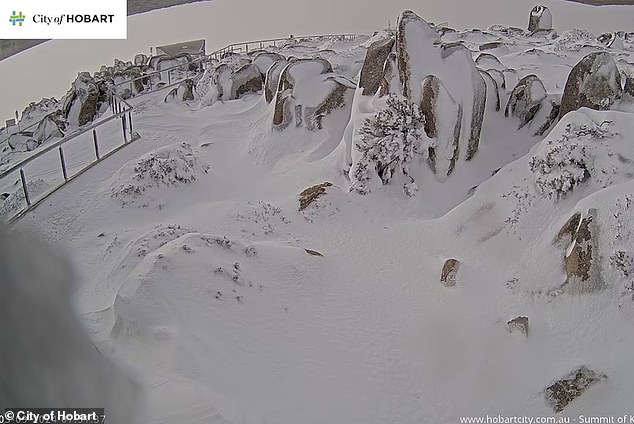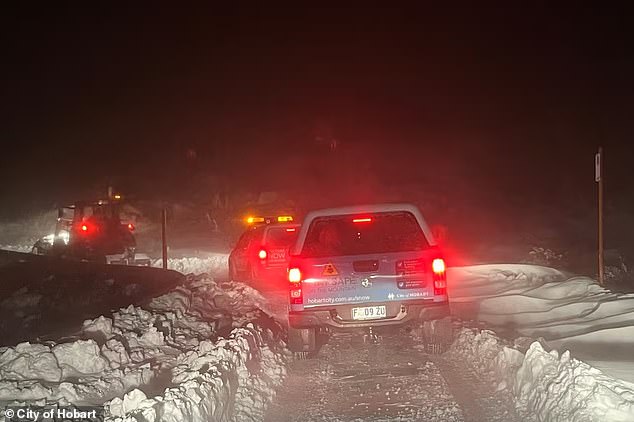Cops ‘gobsmacked’ after rescuing 18 people include three children from freezing mountaintop after cold snap
Eighteen hikers in two separate groups, including three children, left Tasmania police “baffled” after they had to be rescued from a mountaintop in extreme conditions.
On Monday evening, temperatures dropped to a low of -3 degrees Celsius at Kunanyi/Mt Wellington in Hobart, while the wind chill was -21.6 degrees Celsius due to wind and heavy snow.
The dire weather forecast did not deter a group of 13 hikers from attempting to climb the mountain, but they did desperately call for help at 4:15 p.m. as the weather continued to deteriorate.
The hikers had cell phones with them, but “minimal food and drink, and no emergency supplies to get through the night,” police said.
“I’m honestly baffled that anyone would think it’s OK to go up the mountain on a day like yesterday,” Tasmania Police Inspector Kathy Bennet told the ABC Radio Hobartand added that they may have endangered the lives of other people.
Police, working with Hobart City authorities, drove up the mountain in four-wheel drive through the snow, following a tractor with a snowplow.
Hobart Mayor Anna Reynolds said hikers sought shelter on the observation deck at the top of the mountain, 1,271 metres above sea level.
Surprisingly, the group of 13 were not the only ones who were careless when taking a walk through the bush.
Thirteen hikers, including three children, left Tasmania police ‘baffled’ after they had to be rescued from a mountaintop in extreme conditions (pictured)

Temperatures dropped to a low of -3 degrees on Kunanyi/Mt Wellington (pictured) on Monday evening, with a windchill and heavy snowfall leading to a wind chill of -21.6C
As the council staff made their way up the mountain, they encountered another group of five hikers attempting to descend to an elevation of 3,600 feet (1,110 meters), Reynolds said.
The group that had not called for help had to be rescued first, while the larger group waited further away.
“They were very lucky that our staff came by and they were on their way,” she said.
Mrs Reynolds said three of them were ‘in very bad shape’ and the group of five were taken downstairs to warm up.
Police reported that everyone from both groups was safely off the mountain by 10:30 p.m. Monday evening.
An angry Inspector Bennet said the two groups had “potentially put other lives at risk because we had our search and rescue staff in New Norfolk, with the anticipated problems we had there (for flood response) … and we would have to think about redeploying resources to get people out.”
‘If the road is closed, don’t walk there, it’s that simple. Snow and low clouds are not good walking conditions, especially when you have three children walking with you.’
Premier Jeremy Rockliff was also furious, calling what the walkers did “simply ridiculous”.
“We cannot afford to have resources diverted just because people are stupid enough not to heed those warnings,” he said.
‘Fortunately the local government supported that rescue operation as our SES staff and others assisted other communities.’

The hikers had cellphones but “minimal food and water, and no equipment to spend the night in case of an emergency,” police said.

Tasmania Police Detective Inspector Kathy Bennet said: “I’m honestly baffled that anyone would think it was OK to go up the mountain on a day like yesterday.”
Police Inspector Darren Latham said it was very frustrating that police had to regularly warn walkers on the mountain, especially during extreme weather.
‘The Bureau of Meteorology, the SES and Tasmania Police have been warning the community about the extreme weather conditions since last week.
“This also included several weather alerts for hikers,” he said.
Hikers should always prepare for the worst.
‘Our emergency services often endanger their own lives during rescue operations. It is frustrating when the situation could have been prevented.’
